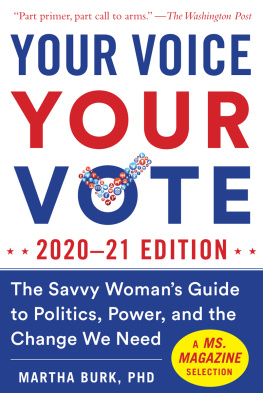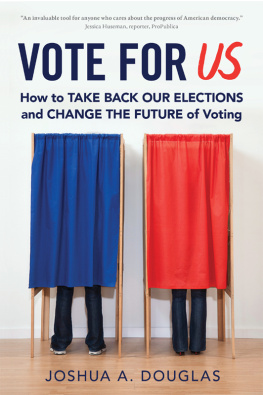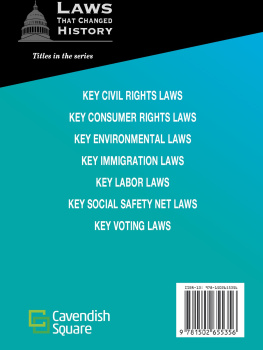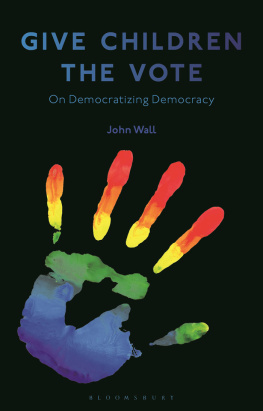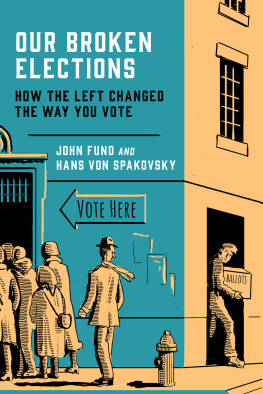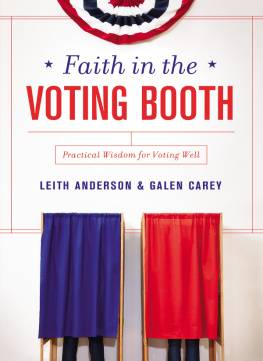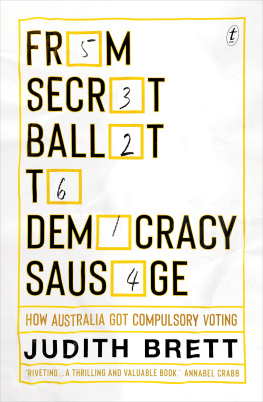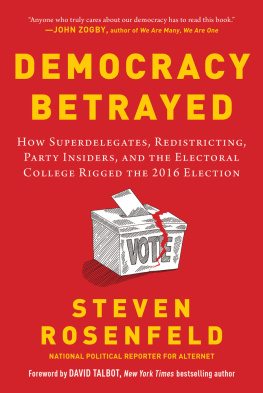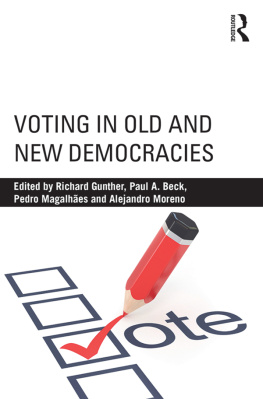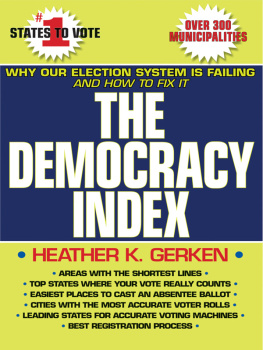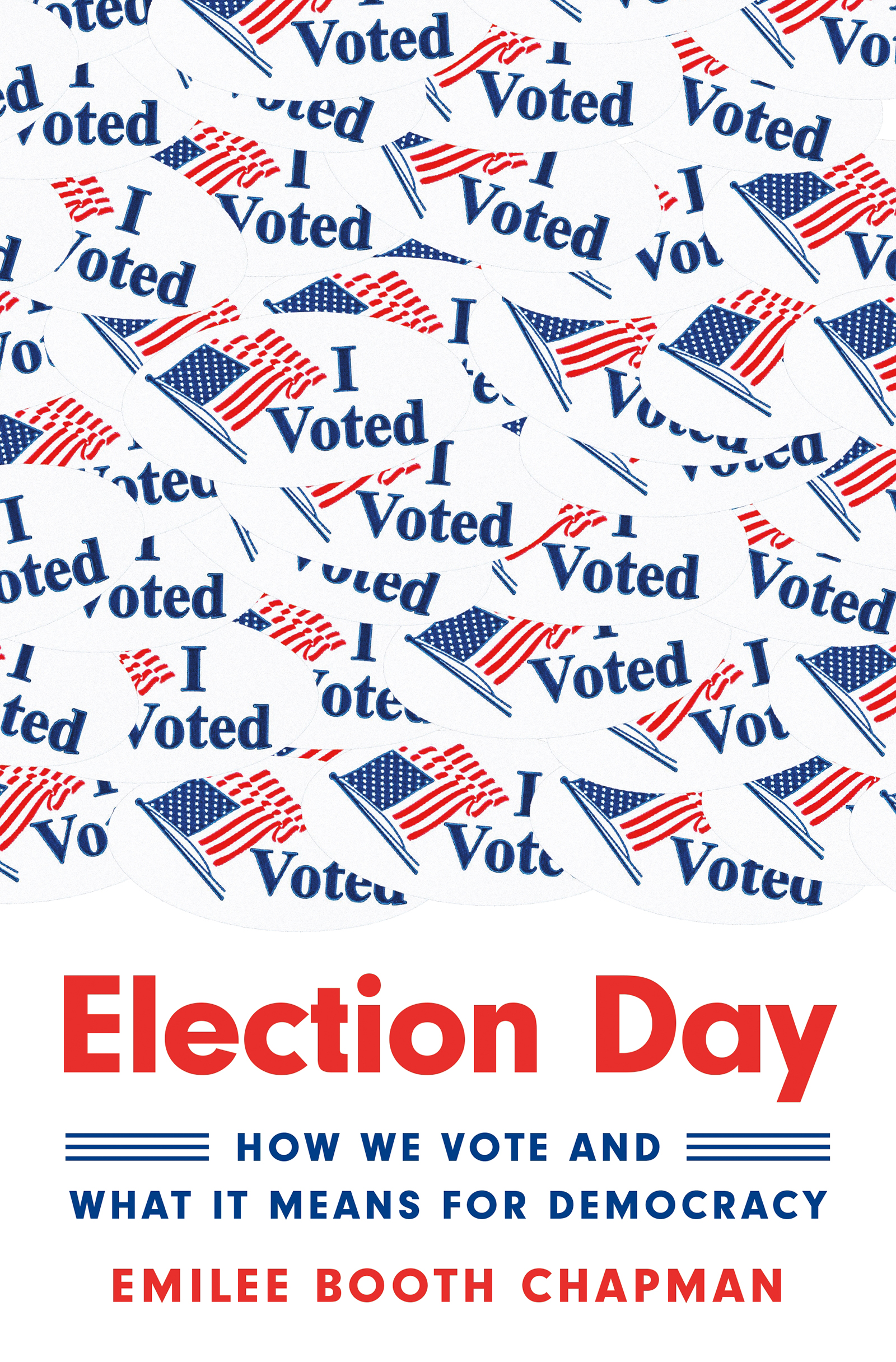ELECTION DAY
Election Day
How We Vote and What It Means for Democracy
Emilee Booth Chapman
PRINCETON UNIVERSITY PRESS
PRINCETON AND OXFORD
Copyright 2022 by Princeton University Press
Princeton University Press is committed to the protection of copyright and the intellectual property our authors entrust to us. Copyright promotes the progress and integrity of knowledge. Thank you for supporting free speech and the global exchange of ideas by purchasing an authorized edition of this book. If you wish to reproduce or distribute any part of it in any form, please obtain permission.
Requests for permission to reproduce material from this work should be sent to
Published by Princeton University Press
41 William Street, Princeton, New Jersey 08540
99 Banbury Road, Oxford OX2 6JX
press.princeton.edu
All Rights Reserved
ISBN 9780691239095
ISBN (e-book) 9780691239071
Version 1.0
British Library Cataloging-in-Publication Data is available
Editorial: Rob Tempio & Chloe Coy
Production Editorial: Ali Parrington
Jacket Design: Karl Spurzem
Production: Lauren Reese
Publicity: Kate Hensley & Charlotte Coyne
Jacket credit: I Voted sticker flysnowfly / Shutterstock
For my mom, who took me with her when she voted, who taught me to love books, and told me I could write one too, if I wanted.
And for my dad, who taught me to do and to love political theory before I knew there was any such thing.
CONTENTS
- ix
PREFACE
As I write this at the start of 2022, it is surprisingly hard to predict what the state of voting law and its political and electoral impact will be by the time you read this. This is not just because of the potential for new far-reaching federal laws. In 2022, we will see how controversial changes to voting laws in Texas and Georgiawhich received so much attention when they passed in 2021play out on the ground in a federal election. State-level elections in 2022 will also affect the prospects of Donald Trumps Stop the Steal campaign to seize political control of the election apparatus in key states. And whatever happens in election law, the focus of public debates about voting and election reform will no doubt shift many times over the upcoming year, as it always does.
With all of this on the horizon, it might seem like a strange choice to send this book to press now. Why not wait? There are three answers to this question. The first is simply that this book is not exclusively about or for the United States. I argue that popular voting plays a similar role in established democracies around the world. Though examples from the United States loom large in this book (because I am a US citizen, educated and living in the United States), its guidance is relevant almost everywhere there are democratic elections.
The second is that, even if we focus primarily on the US, things are always changing. The past decade has seen several landmark moments for voting in the United States. The 2013 Supreme Court decision in Shelby County v. Holder marked a seismic shift in US voting rights law and paved the way for contemporary battles over state-level election administration. Other Court cases, like Gill v. Whitford (2018) which challenged the practice of partisan gerrymandering, garnered attention for the transformative potential they failed to realize. Donald Trumps victory in 2016, of course, brought renewed attention to the Electoral College, to political polling and media coverage of election campaigns, and to turnout disparities. 2016 also upended many assumptions about the nature of parties and partisanship and their role in electoral agenda-setting. 2018 saw record-breaking numbers of women running for and winning office in the United States, and a remarkable surge in turnout among young adults. The pandemic conditions in 2020 brought massively increased availability and uptake of mail-in and early voting opportunities. And, of course, in 2020 and 2021, we have seen the systematic efforts of one partyled by Donald Trumpto discredit the election results, and we saw insurrection at the Capitol as the 2020 presidential election results were being certified. There is no reason to think that things will settle down anytime soon. And this rapid pace of change and resulting uncertainty gives us all the more reason to take time now to reflect on how we vote and why it matters.
The third answer is that, while this book certainly speaks to contemporary issues and debates, they are not its main motivation. This book has been ten years in the making, conceived and almost entirely written prior to November 2020. The thing that initially gave birth to this book was not the rise of populism. Nor was it even the demise of the preclearance coverage regime or the subsequent explosion in strict voter ID laws and polling place closures. What drove me to write this book was as much a problem in democratic theory as a problem in democracy. Whenever I told family, friends, or friendly strangers that I study the ethics of democracy, I was usually met with some remark about voting (most often: how can we get young people to care about voting?). But voting was conspicuously absent from the democratic theory that I was reading as a young academic. What discussions of voting I did find were largely skeptical of folk attitudes toward voting and saw a need for theory to correct the overemphasis on voting in popular discourse. This dismissive treatment of popular voting in academic democratic theory struck me as both odd and troubling. Political theorists had done a great job of demonstrating what voting cant do but had left us without an adequate theory of what it can and should do. That is the problem to which this book responds.
I believe it is because much of this book was written in a different electoral context, that the ideas I develop here offer important resources for responding to our current moment. Scholarship that primarily responds to specific, recent events runs the risk of overfitting its models to the particulars of these events or to the salient narratives that emerge about them. The arguments in this book, on the other hand, have been developed over a decade that has seen many dramatic changes in the electoral context and the focus of public debate. These arguments, therefore, point to a set of concerns as well as a set of recommendations that have not received enough attention in recent public conversations about voting and elections.
Elections are not just information-gathering exercises. They also structure the discursive environment of democratic communities, facilitate mobilization and organization, and socialize citizens into their role as equal political agents. Occasions for popular voting make the abstract notion of democracy concrete and manifest for citizens. They enable us to see how the collective activity of democracy is constructed from the contributions of individual citizens. As I argue in the book, when we highlight these functions of popular voting, it becomes clear that the democratic value of elections depends on how citizens perceive and experience electoral moments.
Here is one example of how this holistic, big-picture understanding of popular votings role in modern democracies can help us respond to the problems of the moment: it can help us diagnose and address the narratives of widespread voter fraud that have altered the meaning of recent elections for many American citizens. Even if these narratives do not prevent the peaceful transfer of power, they nevertheless undermine a crucial democratic purpose of popular voting. Discussions of this problem commonly focus on the mechanical properties of elections as a procedure for fairly selecting representatives and peacefully settling political conflict. But, as I demonstrate in this book, popular voting also plays an important role in mediating citizens relationship to democracy. Voting shapes citizens attitudes toward and interactions with democracy, and how we see our place within it. Even if efforts to delegitimize the results of a particular election fail in the moment, they may still do lasting damage to our most important tool for political socialization.


